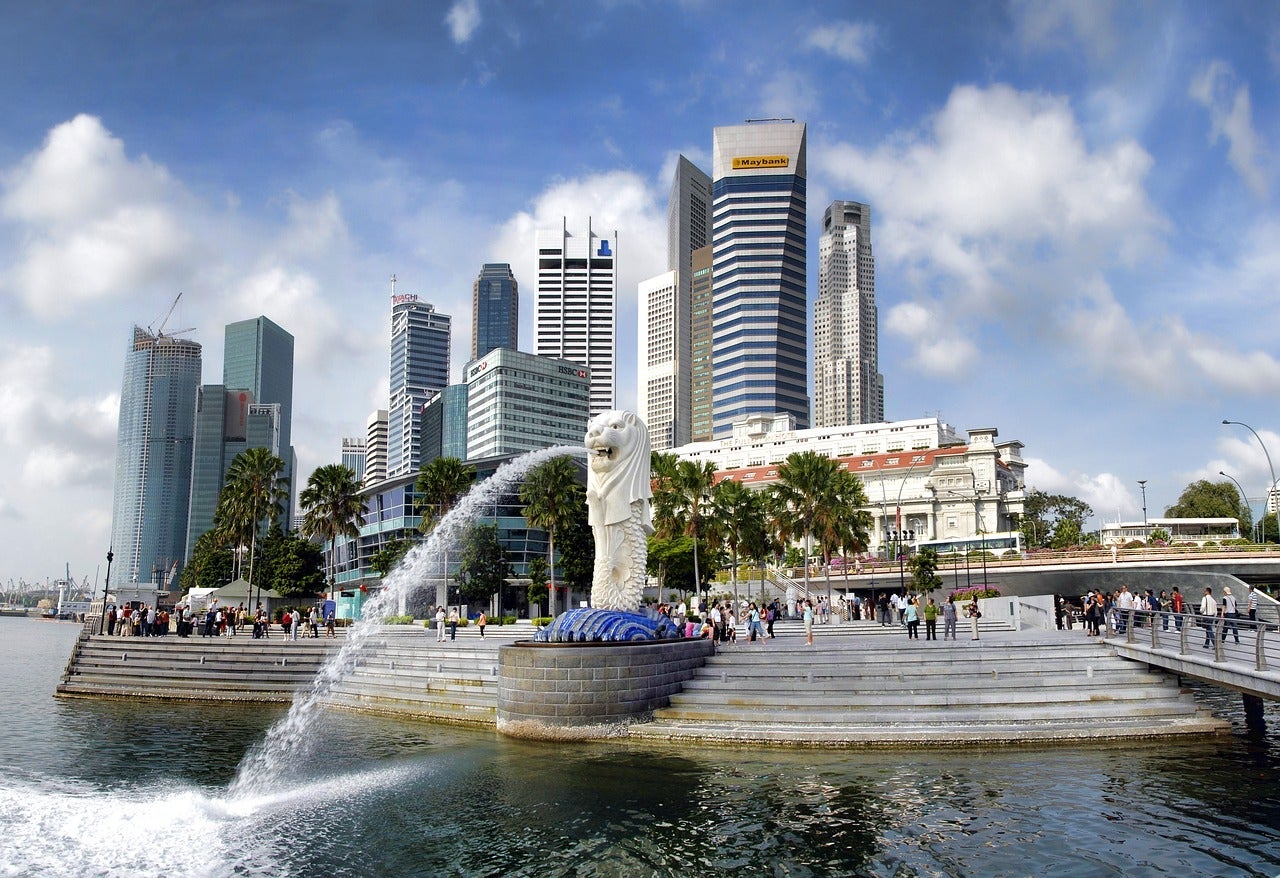The best cities for first-time visitors to Asia
Update: Some offers mentioned below are no longer available. View the current offers here.
Asia is huge and diverse, with so many attractive travel destinations. From Indonesia to China, Nepal to Cambodia, and Vietnam to Japan, there's so much to love about this fascinating and vibrant continent. But with almost 60% of the world's population (yes, you read that right) and some seriously crowded cities, all but the most experienced of travelers may feel daunted considering where to start for a first-time visit to the continent.
All visitors to Asia's major cities must come to terms with the fact that they are very crowded, with an almost endless amount to see and do. But that doesn't automatically mean that they're difficult to navigate or stressful places to spend time.
Certain East and Southeast Asian cities are best suited to first-time travelers to Asia, as they're highly organized, generally very safe for travelers and you don't need to know much (if any) of the local language to get around, while other South and Southeast Asian destinations (such as India or the Philippines) are probably better left until you have more travel experience in the region.
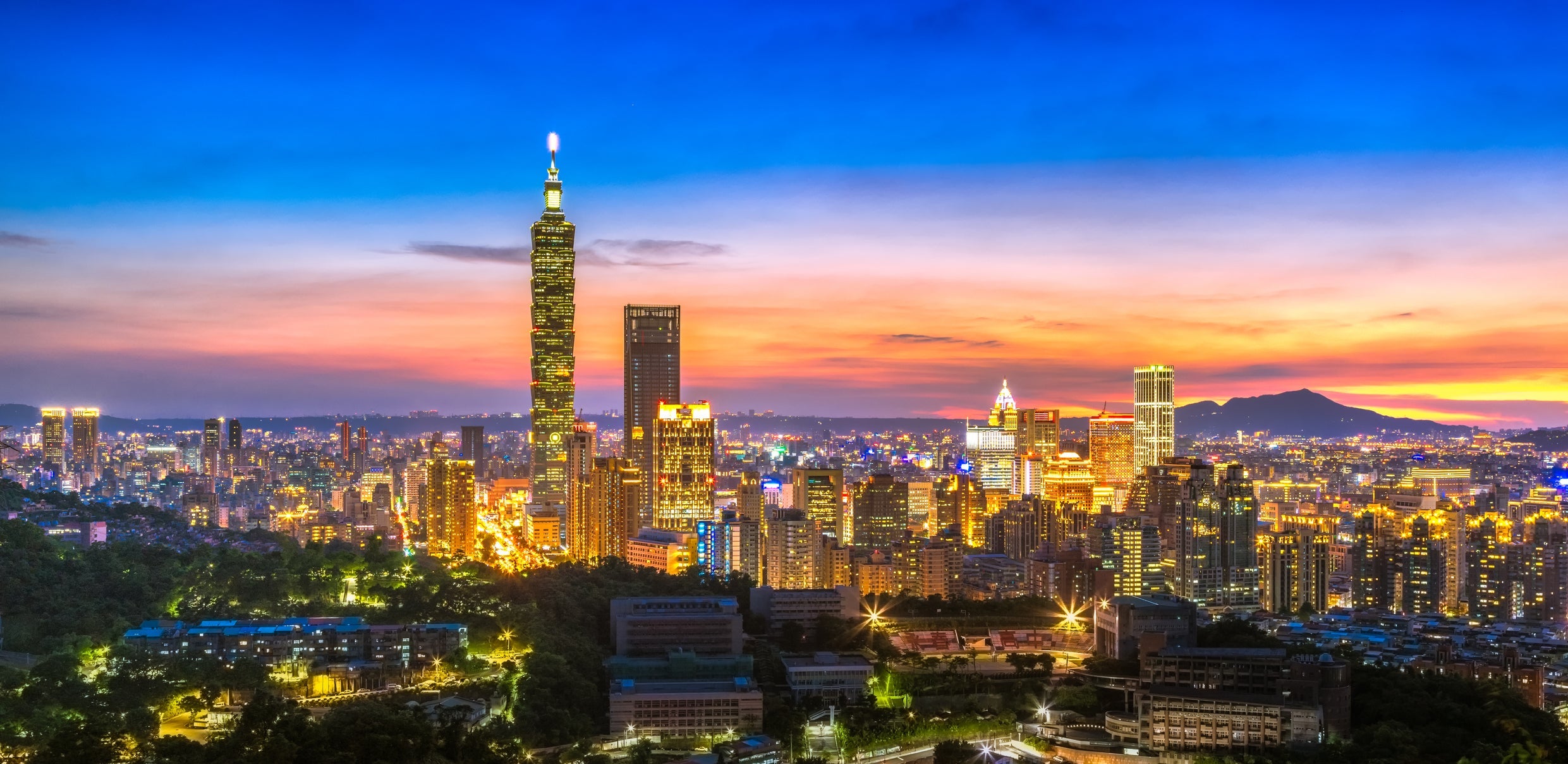
We've identified a few of the best cities for first-time travelers to Asia to check out. They're all worth a city-break vacation in their own right, or can be used as jumping-off points for exploring other parts of the country and region.
[table-of-contents /]
Tokyo, Japan
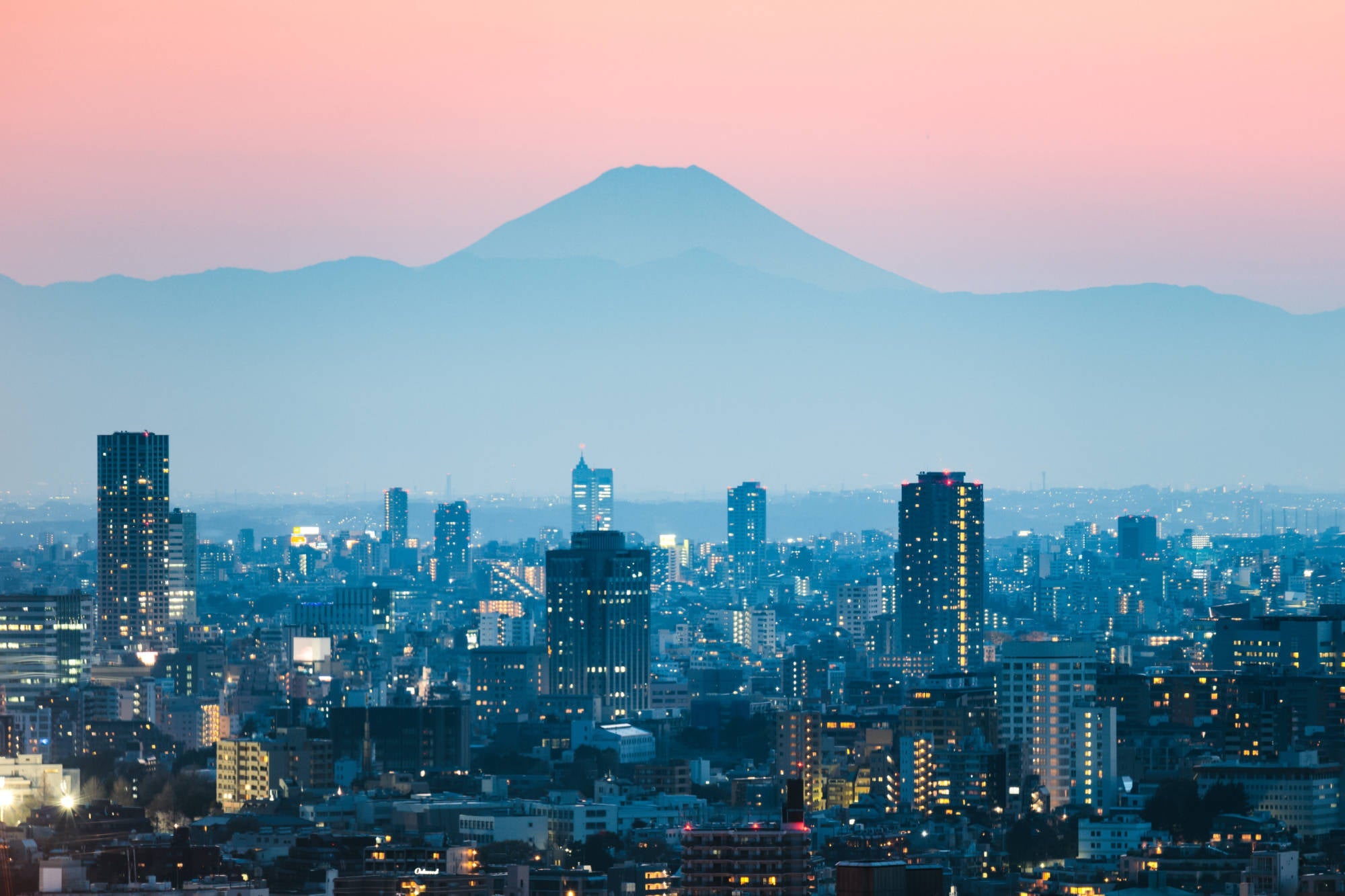
Major airports: Narita International Airport (NRT), Haneda International Airport (HND)
Related: Tokyo Narita vs. Haneda: Which airport should I fly to?
Who flies there: Many major international airlines fly to Tokyo's airports, including United, American Airlines, Hawaiian Airlines, ANA (All Nippon Airways), Japan Airlines, Qantas and Singapore Airlines. (Both ANA and Japan Airlines have announced that many of their flights will move from Narita to Haneda.)

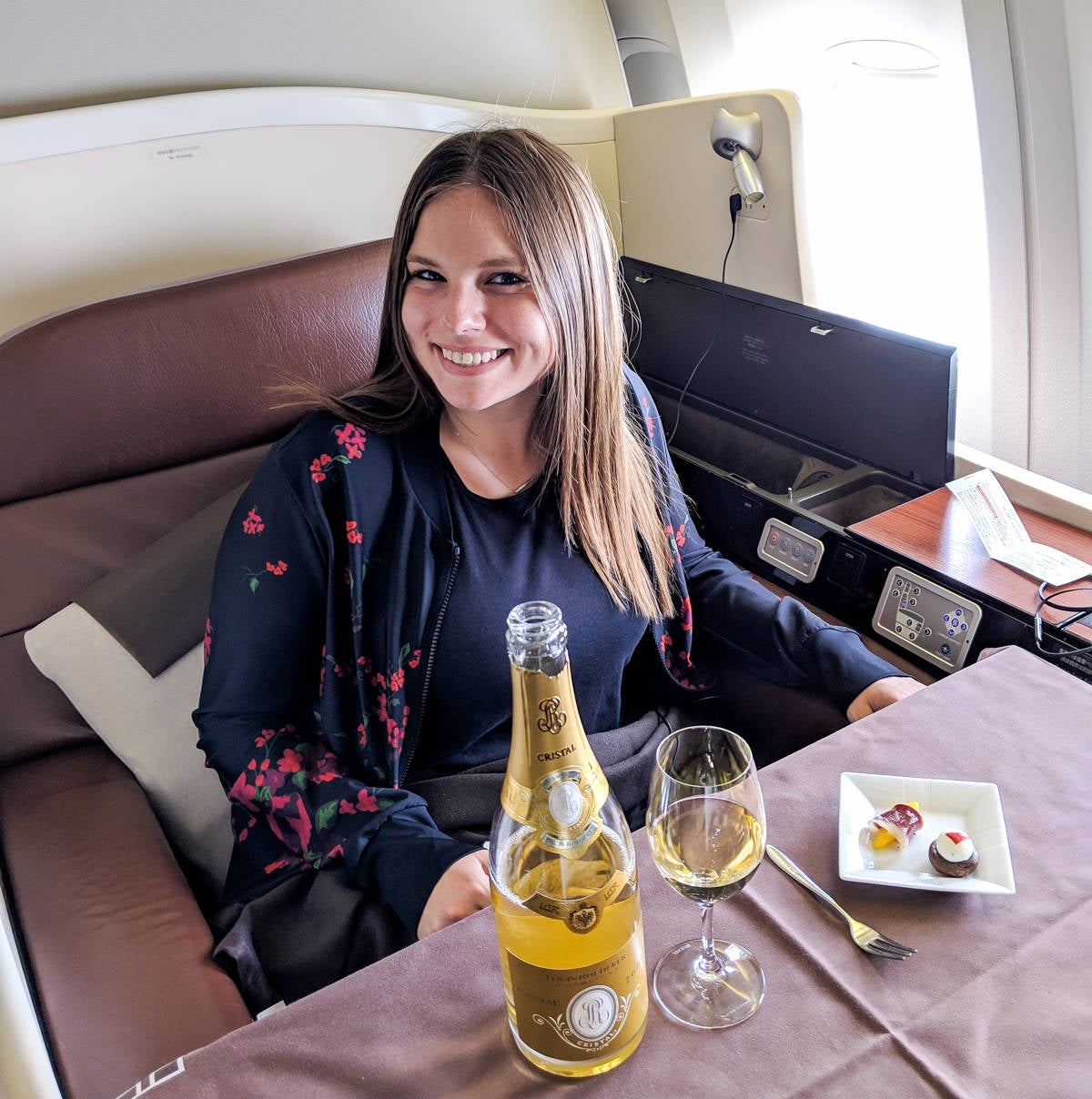
Related: 3 ways to do Tokyo on points
Why first-time travelers to Asia should visit Tokyo: Tokyo is the definition of a mega-city, with around 10 million inhabitants, but it's not intimidating. Everything from the public transit to the garbage disposal runs smoothly and efficiently, Japanese people are generally very polite and introverted in public spaces, the crime rate is very low and tourists are highly unlikely to be a target. There's an enormous amount to see and do, whatever your interests. And if crowds aren't your thing, there are many peaceful parks and temples to which you can retreat.
While Tokyo is generally an expensive destination to visit, there are many ways to keep spending in check. Lots of attractions in Japan are free, including some parks and temples. Transportation is not very expensive, and you can make it even more affordable by buying a pass corresponding to the length of your stay.
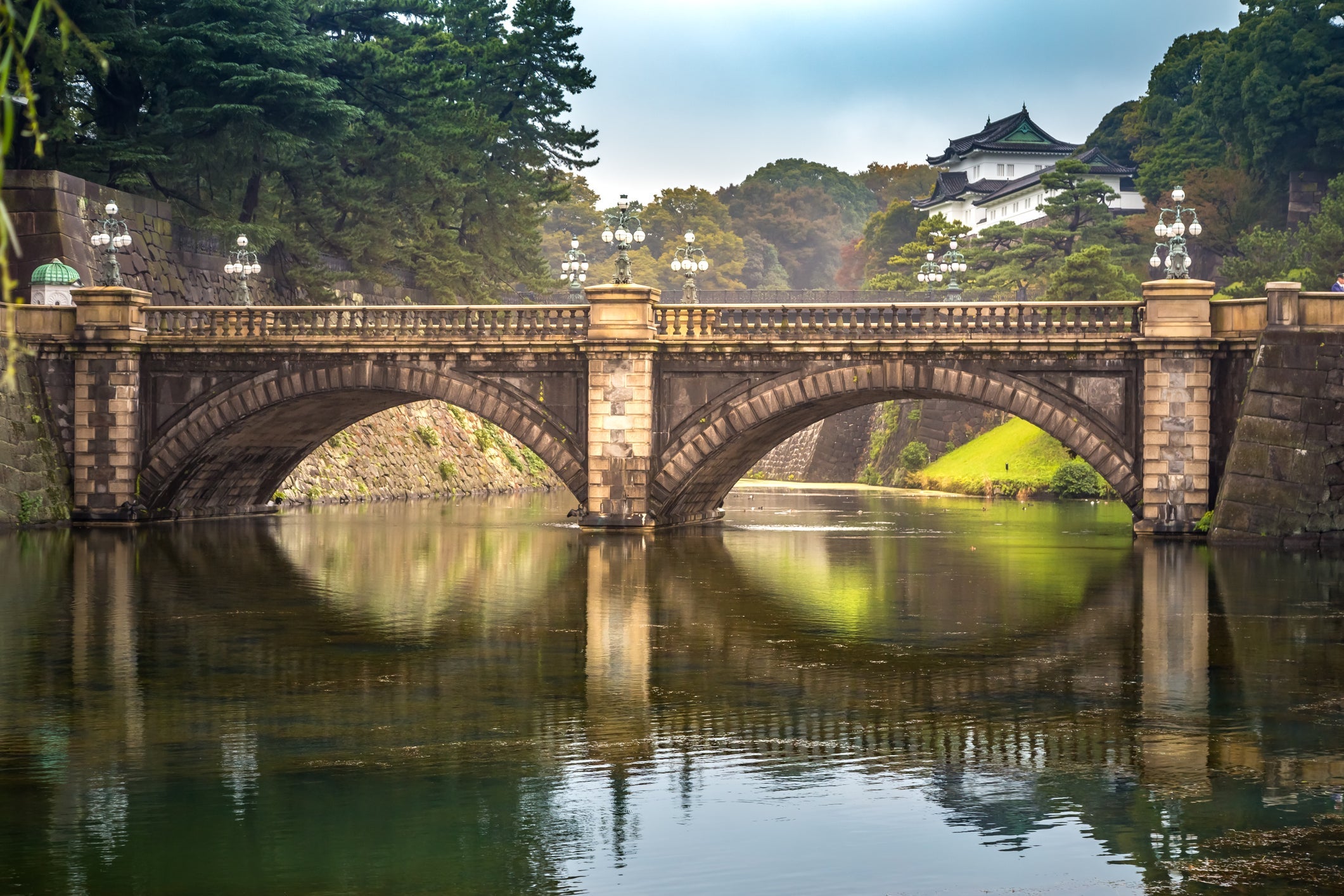
Language(s) spoken: Japanese. English is spoken and understood by many in the travel industry, and English signs can be found in most public transportation situations. In general, though, the use and comprehension of English is not high, and the average Japanese person on the street won't understand you if you stop them to ask for directions in English.
How to get around: Tokyo has an extremely extensive network of public transportation, so there's no need to rent a car or take taxis most of the time. Overland and subway trains are generally more useful and user-friendly to international visitors than buses. There are many train lines run by different companies, and while tickets are not always interchangeable between these networks, you can buy daily or weekly transport passes to reduce costs. The subway is handy for getting around the central city, as is the circular above-ground JR Yamanote line.
Top sites: Whatever your interests, Tokyo will satisfy you. The neighborhood of Asakusa is a great place to start your Tokyo exploration, as it has a more traditional feel than most other parts of the city. In July and August 2020, the Olympics will be held in Tokyo. To experience quintessential neon Tokyo, head to Shinjuku and Shibuya. For a glimpse into the future, check out the artificial island of Odaiba. For a peaceful temple experience, visit Hikawa Jinja. For high-end shopping (or browsing), don't miss Ginza.
Top points hotels: Tokyo is an expensive destination, but there are many points options to reduce the cost of your stay. Here are a few:
- Courtyard Tokyo Station (Category 5, 35k Marriott points on standard nights or use a 35k free night certificate)
- Hyatt Regency Tokyo (Category 3, standard rooms from 12,000 World of Hyatt points per night or 17k for a room with Club Lounge access. Or, use a Category 1–4 free night certificate.)
- ANA Intercontinental Tokyo (From 55k IHG Rewards Club points per night)
- Conrad Tokyo (95k Hilton Honors points per night or use a Free Weekend Night certificate)
- Park Hyatt Tokyo (Category 7, standard rooms from 30k points per night)
- Prince Gallery Tokyo Kioicho (Category 8, 85k Marriott points on standard nights)
Related: 3 of the best-value points hotels in Tokyo
If you're looking for a more affordable stay in Tokyo, look for business hotels. They are generally not spacious and lack character, but come with all the basics and are a decent place to lay your head for the night in a lower price point. You could also try a capsule hotel; here's what it's like to stay in a capsule hotel with kids.
Singapore
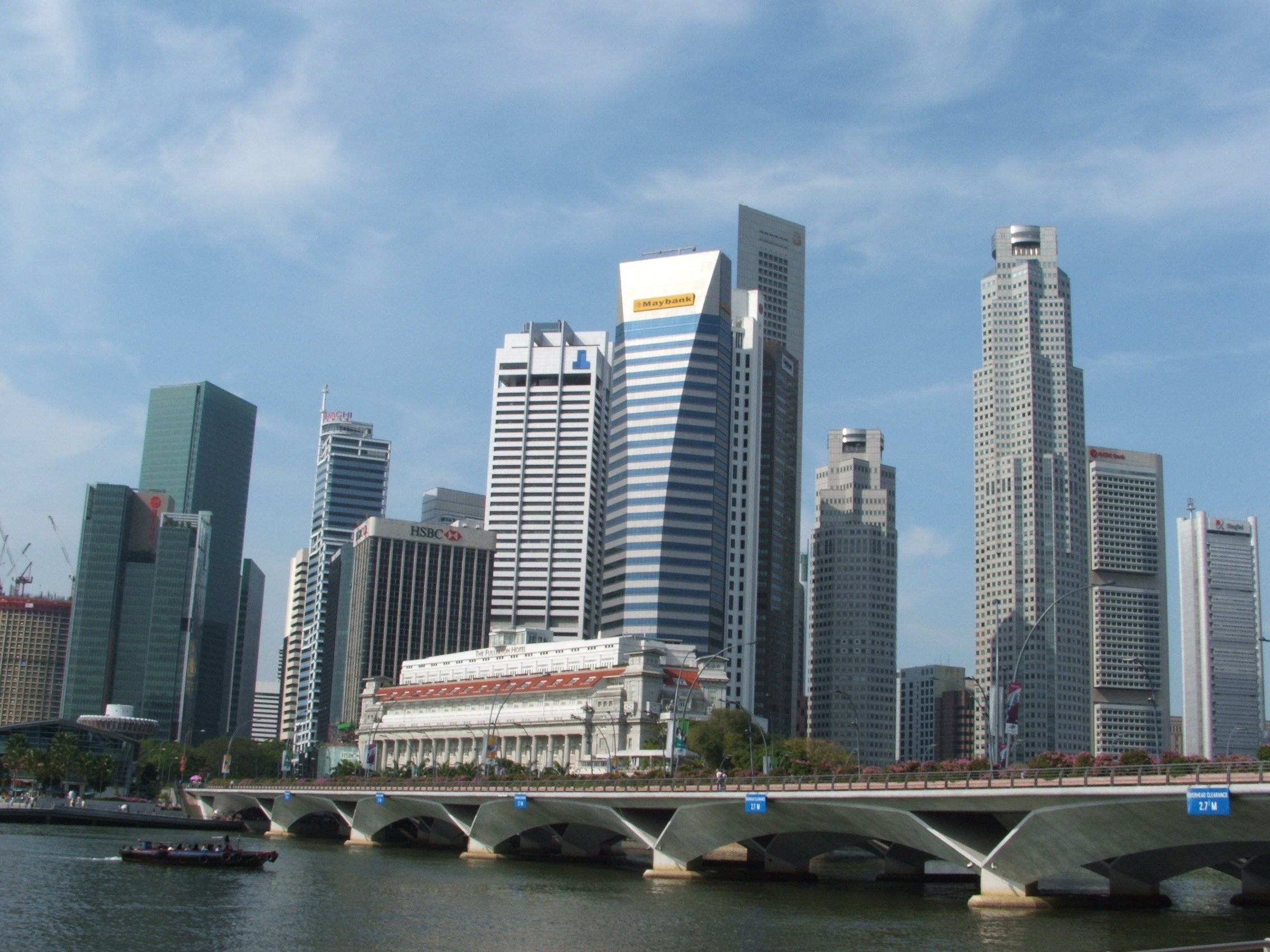
Major airport: Changi International Airport (SIN)
Who flies there: Many major international airlines fly to Singapore, including United, Singapore Airlines, British Airways, Emirates and Qantas. East Coast-based travelers can even take what is currently the world's longest flight, from Newark to Changi.
Related: How to book Singapore Airlines awards using Alaska miles
Why first-time travelers to Asia should visit Singapore: The city-state is a major financial hub in the region, which is evident in its glitzy high-rises and waterfront developments, but you can also find pockets of older, more traditional Southeast Asian culture, as well as green spaces both within the city and just outside. It's a very safe city (the country's notoriously strict punishments play a major part in this), and English is one of its four languages, so you won't have trouble being understood. Plus, Singapore's reputation for orderliness and cleanliness is not a myth.
Singapore is also an excellent destination for first-time family travelers to Asia, as the mix of indoor, cultural, and nature-oriented attractions should appeal to all members of the family (not to mention the general cleanliness).
Related: 3 ways to do Singapore on points
Language(s) spoken: Malay is the official language of Singapore, and Mandarin Chinese, Tamil and English are also widely spoken. Most Singaporeans are either fluent or conversant in English, even if it's not their first language, as it's the language of instruction in schools. All public signs are in English as well as Malay, Chinese and Tamil.
How to get around: Singapore has a good network of trains (the MRT) and buses, plus taxis are very affordable.
Top sites: A bumboat cruise down the Singapore River is a good and relaxing way to get an overview of the central city area, as is a circuit on the Singapore Flyer, an enormous Ferris wheel. The futuristic Gardens by the Bay could entertain you for an hour or a day. Don't miss the famous Merlion Statue. The Singapore Zoo is highly respected. To get out of the concrete jungle, head to the Bukit Timah Nature Reserve for a hot and steamy forest hike. Note that Singapore is a tropical country, so it's hot and humid year-round, which may affect your sightseeing plans depending on how you like your weather.
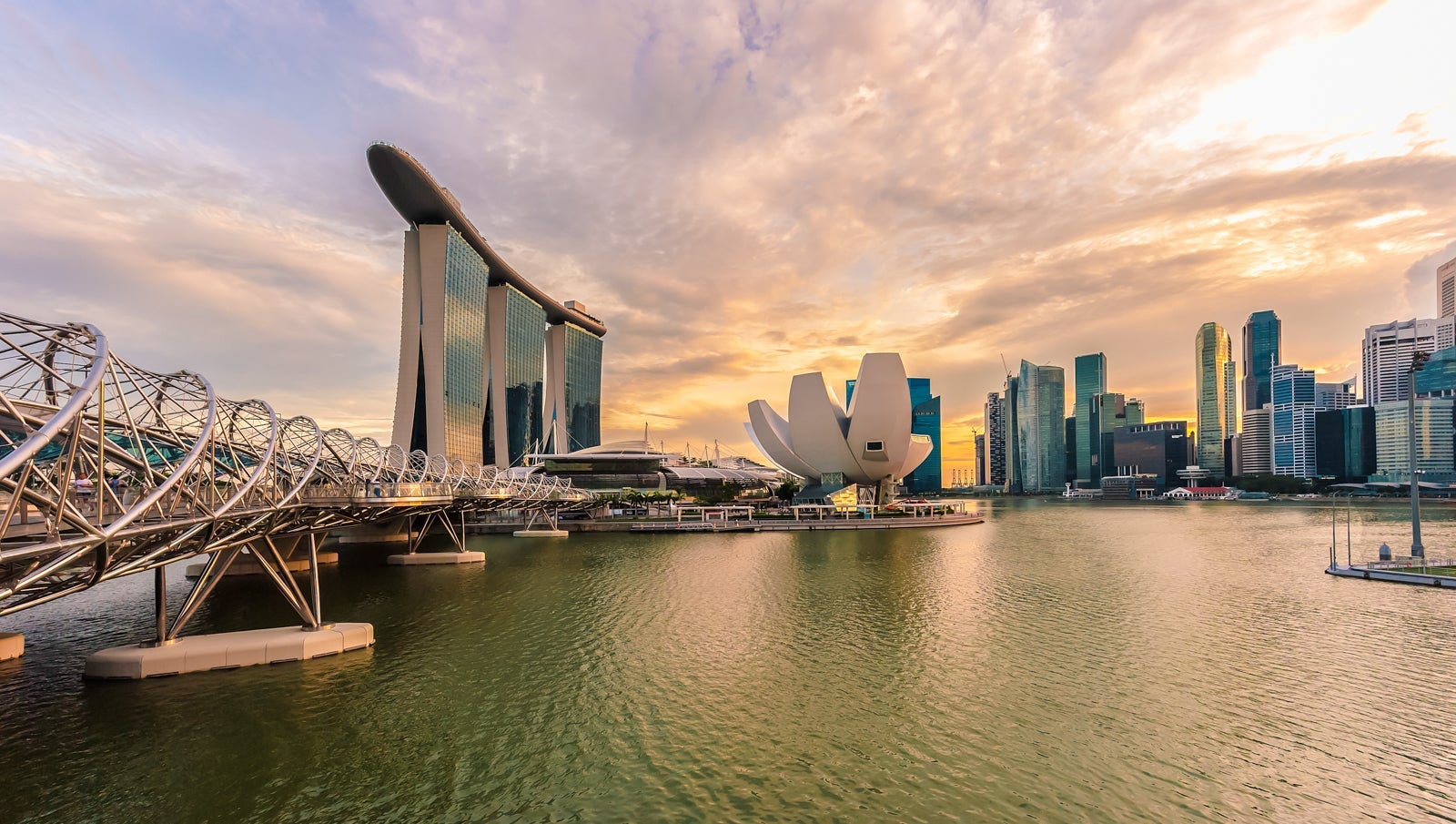
Top points hotels: Singapore is a major business hub, so there is a huge range of hotels catering to different types of traveler. Some great hotels where you can use and earn points include:
- JW Marriott Hotel Singapore South Beach (Category 7, from 60k points per night on standard dates)
- The Westin Singapore (Category 6, from 50k Marriott points per night on standard dates, or use a 50k free night certificate)
- Hotel Indigo Singapore Katong (From 35k IHG Rewards Club points or use an Anniversary Night certificate from the IHG Rewards Premier Credit Card)
- Six Senses Duxton (Pay with a card like the Capital One® Venture® Rewards Credit Card that allows you to "erase" travel purchases from your statement using your Capital One miles.)
Related: These are the best times to visit Singapore
Bangkok, Thailand
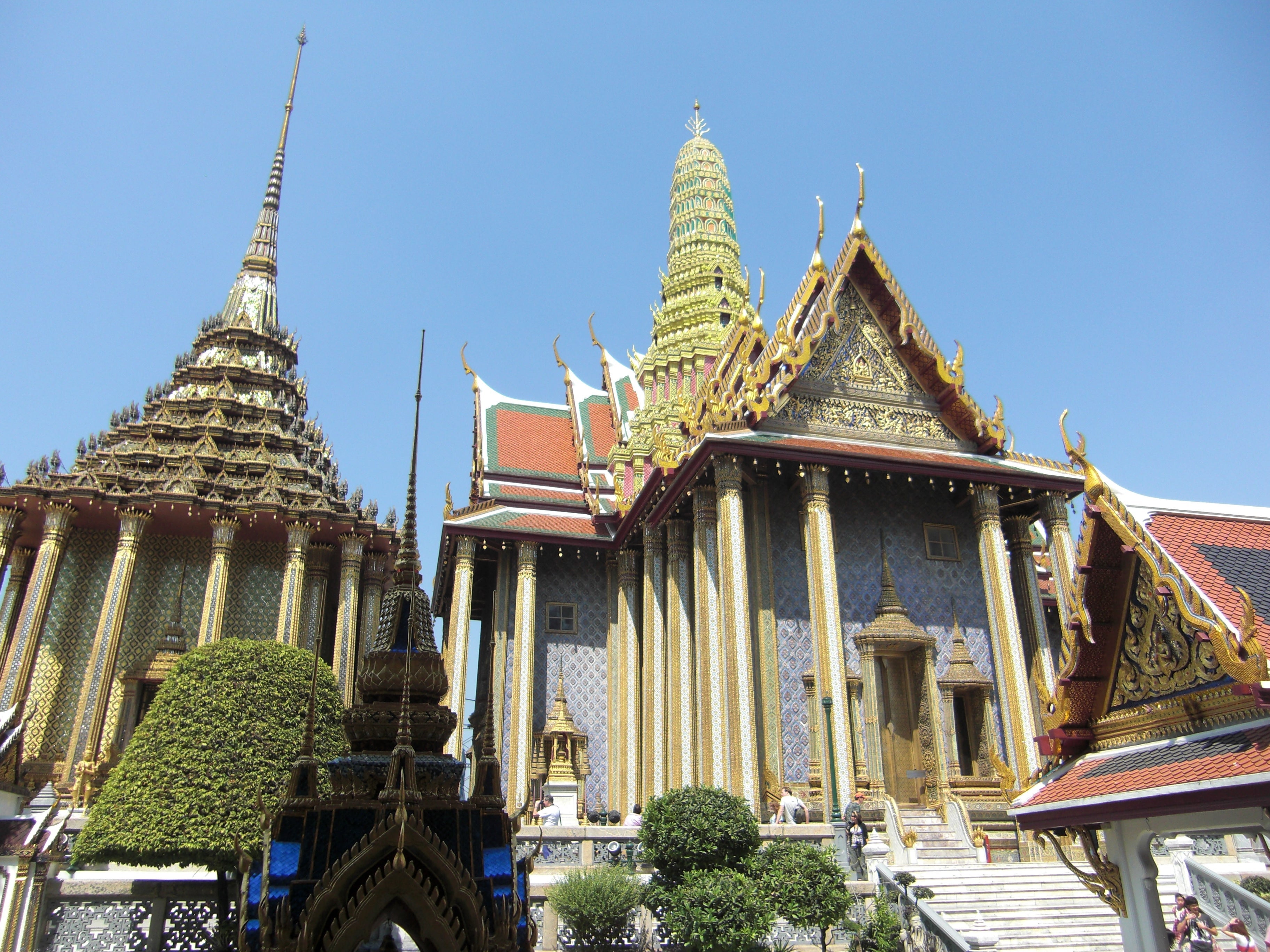
Major airports: Suvarnabhumi International Airport (BKK), Don Mueang International Airport (DMK, mainly for regional low-cost carriers).
Who flies there: A large number of international airlines fly to Bangkok, but travelers coming from the U.S. may need to stop elsewhere first, or board a code-share flight. Airlines that fly to Suvarnabhumi include Thai Airways, Singapore Airlines, Qantas, Emirates and Cathay Pacific.
Related: The best ways to get to Thailand using points and miles
Why first-time travelers to Asia should visit Bangkok: Bangkok offers an enticing mix of glitzy modernity and traditional Thai culture. The spectacular, sparkling temples and palaces are unlike anything that most first-time visitors to Asia will have seen before, and the shopping experiences combine high-end glamor, outlet bargains and traditional markets. Plus, once you've had your fill of big-city Thai life, it's easy to get to the beautiful islands and beaches of Thailand from Bangkok. Although you should keep your wits about you, as you would in any large city, Bangkok is relatively safe.
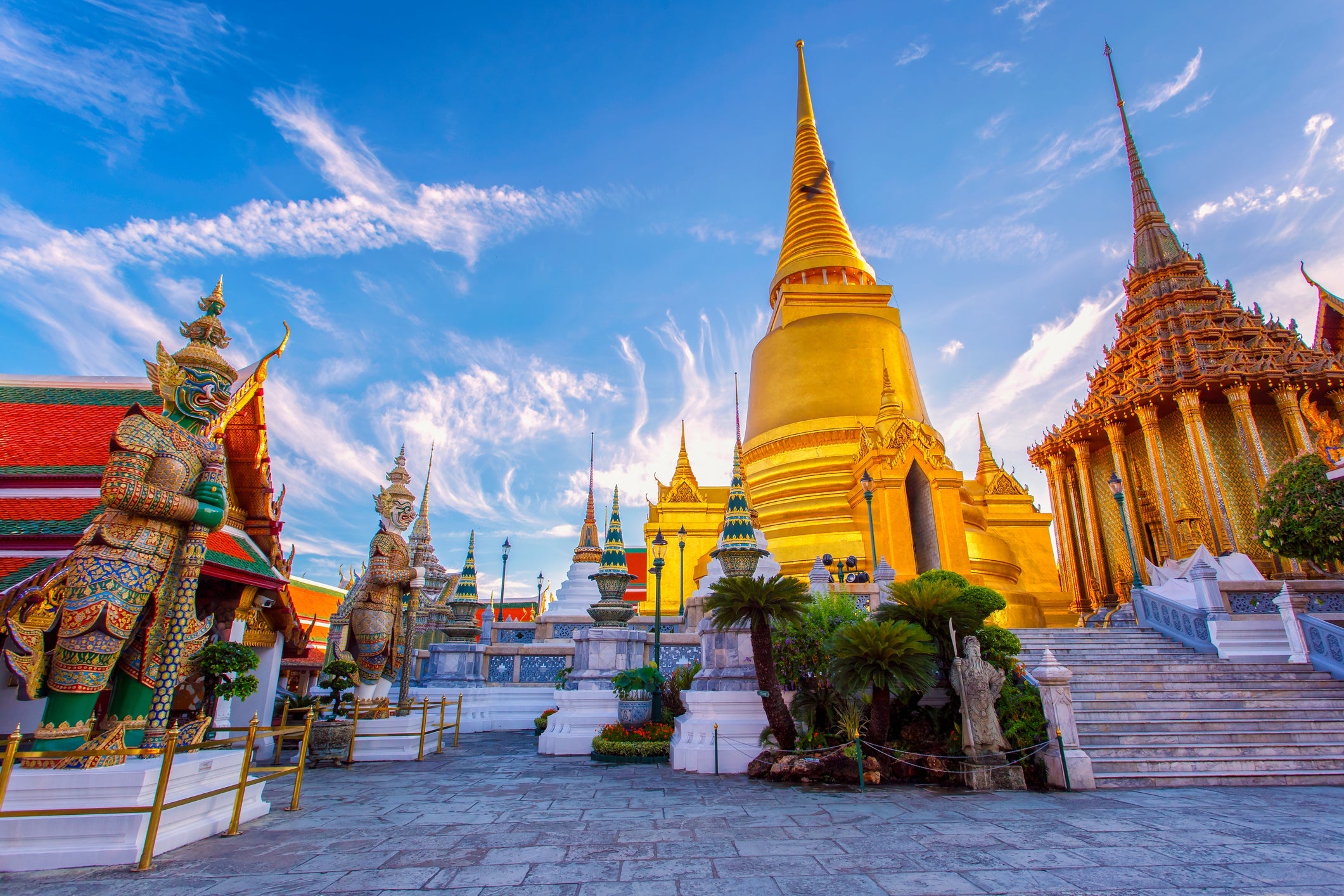
A very, very important thing for first-time visitors (or, any visitors for that matter) to understand is Thailand's strict lese majeste laws. Saying or writing anything that could be understood as insulting the king is a highly punishable offense. If you have opinions on the monarchy, keep them to yourself while in Thailand. Read more in the following article: 11 Mistakes Tourists Make in Bangkok and Beyond
Language(s) spoken: Thai. English is not commonly understood, although it is used by people working in tourism and at restaurants frequented by tourists. Road and transport signs are also usually in English. You can't expect taxi drivers or other Thais not working in tourism to understand or read English: ask your hotel for a business card in Thai in case they have trouble understanding where you want to go. (Unfortunately, it's not uncommon to find taxi drivers who can't read Thai either, which is a good reason to opt for the Skytrain when you can).
How to get around: While taxis and tuk-tuks are abundant in Bangkok, the traffic is often gridlocked, so a better way of getting around is the elevated Skytrain system. While you can't get everywhere in the city on the Skytrain, it does criss-cross much of Bangkok, so if you combine it with shorter taxi or tuk-tuk rides you'll save yourself a lot of time. Water taxis are a convenient way of getting between parts of the city located along the river.
Top sites: Bangkok's temples and palaces should be a first port of call for first-time visitors to the city. The Grand Palace complex is absolutely dazzling -- literally and figuratively -- and contains many temples within its walls. Other unmissable temples include Wat Pho and Wat Arun. If you're in Bangkok at the weekend, head to the enormous Chatuchak Weekend Markets. If you're interested in Thai art and culture, head to the beautiful Jim Thompson's House. To get out of the city for a day, make a day trip to Ayutthaya, the old capital, dotted with ruined temples.
Top points hotels: Bangkok has a huge range of hotels to suit any budget, from backpacker to boutique to luxury. Here are a few of the best points hotels in the city:
- St. Regis Bangkok (Category 5, from 35k Marriott points per night on standard dates, or use a 35k free night certificate)
- Waldorf Astoria Bangkok (From 74k–80k Hilton Honors points per night or use a Free Weekend Night certificate)
- The Athenee Hotel (Category 5, from 35k Marriott points per night on standard dates, or use a 35k free night certificate)
- Park Hyatt Bangkok (Category 5, from 20k World of Hyatt points per night)
Taipei, Taiwan
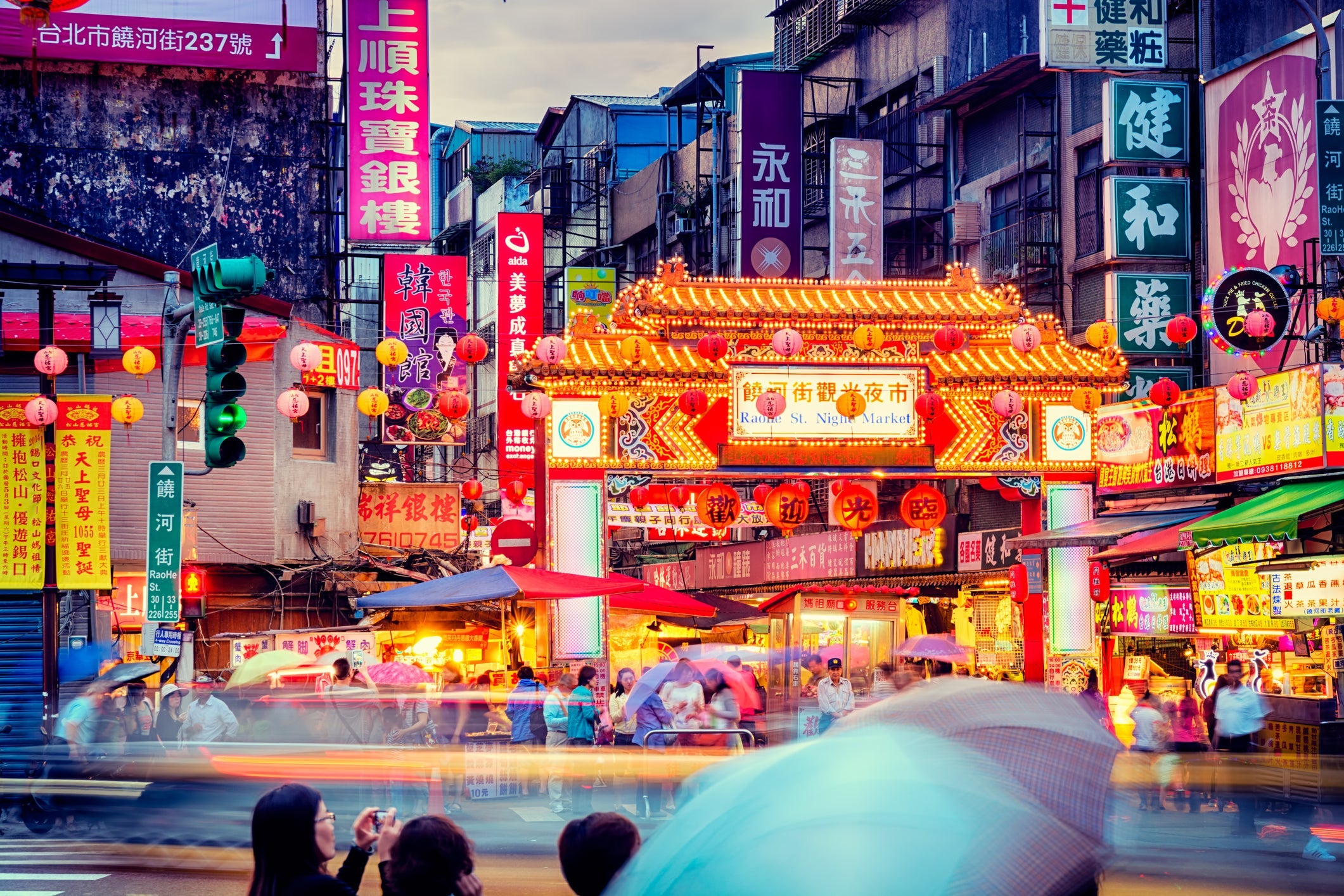
Major airport(s): Taiwan Taoyuan International Airport (TPE)
Who flies there: Several international airlines fly to Taipei, including United Airlines, Singapore Airlines, Qantas, All Nippon Airways (ANA), EVA Air, China Airlines, Emirates and Cathay Pacific.
Related: 8 things to know before you go to Taipei
Why first-time travelers to Asia should visit Taipei: Taiwan's capital is often overlooked by travelers in favor of other East Asian giants like Tokyo or Hong Kong, but that's all the more reason to visit. Infrastructure is well set up for tourists, without the city being "touristy." Plus, Taipei is more affordable than, say, Tokyo or Singapore. First-time travelers to Asia shouldn't just stick to Taipei, as the small island of Taiwan is underrated, with beautiful outdoor attractions like mountains, beaches, forests and interesting indigenous cultures within easy reach of the city.
Language(s) spoken: Mandarin Chinese, and other dialects of Chinese (Hokkien and Haka). While many Taiwanese people don't speak or understand English, traveling to Taipei without any knowledge of Chinese isn't a problem. Major signs usually have an English translation, and in many places you'll be able to find an English speaker if you really need one.
How to get around: The extensive Taipei Metro is the best way to get around the city. Most points of interest to travelers are reasonably close to a station, and it's fast and efficient. There are also buses if you want to go somewhere a little further afield that's not covered by the metro, but they can be harder to navigate if you don't read or understand Chinese.
Top sites: Night markets are a big deal in Taipei, and they're both a great way to try tasty local food on the cheap and experience local culture. For a literal overview of the city from what was, for a few years, the tallest building in the world, head on up to the 89th-floor observatory of Taipei 101.
Top points hotels: Taipei is an affordable city, so if you can't (or won't) use points to book a hotel, you can easily find a central-city room in a decent hotel for a very good price. But, here are a couple of points hotel suggestions:
- Grand Hyatt Taipei (Category 4, from 15k World of Hyatt points per night for a standard room or from 21k points for a room with Club access, or use a Category 1–4 free night certificate)
- Hotel Eclat Taipei (Category 3, from 12k Hyatt points per night, or use a Category 1–4 free night certificate)
- Le Meridien Taipei and W Taipei (Both are Category 6, from 50k points per night on standard dates, or use a 50k free night certificate)
- Holiday Inn Express Taoyuan (not actually in Taipei per se, but conveniently close to the airport)
Seoul, South Korea
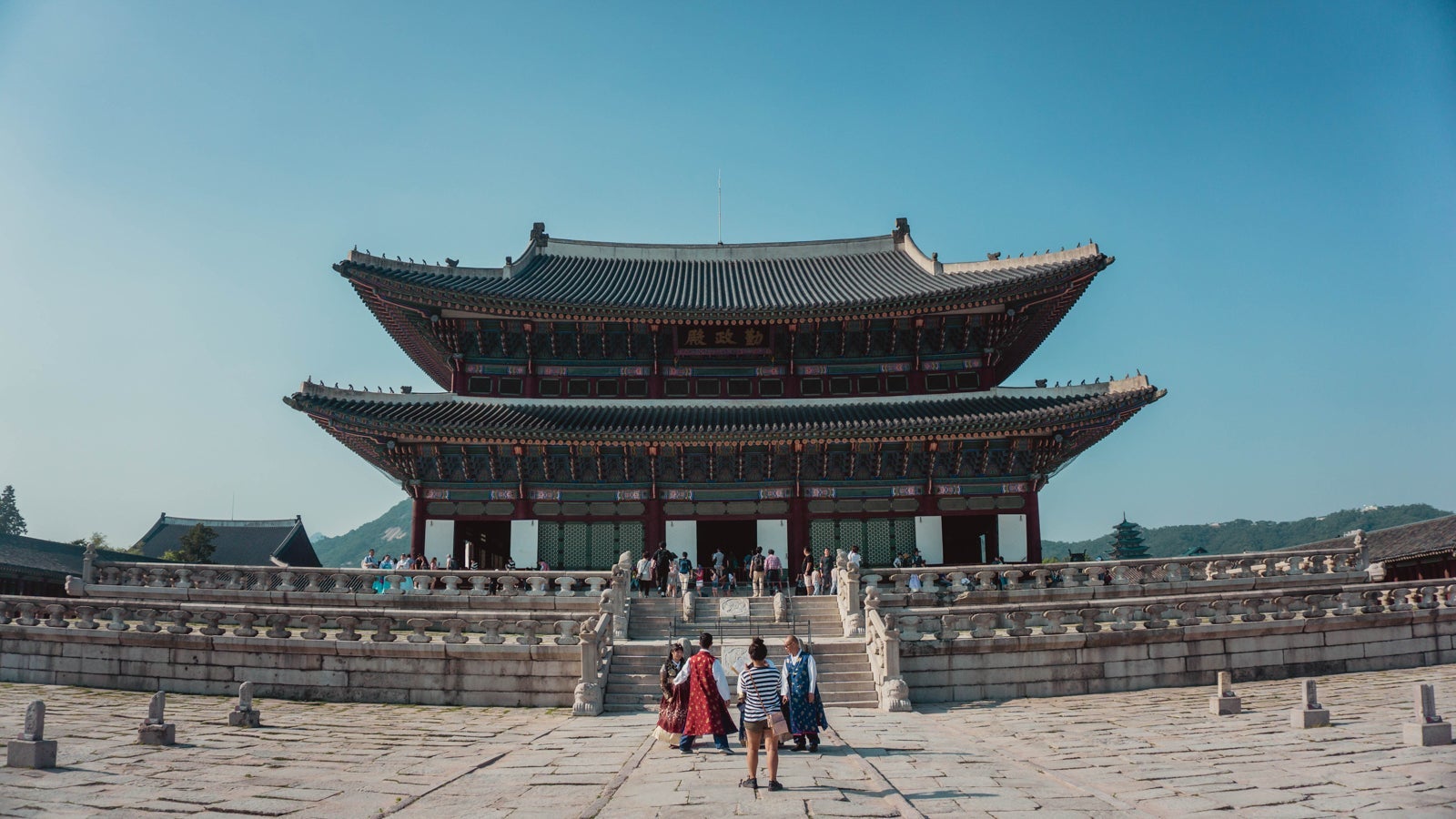
Major airports: Incheon International Airport (ICN), Gimpo International Airport (GMP, mainly for short-haul flights to China and Japan).
Who flies there: Many international airports fly to Incheon, including United, Hawaiian Airlines, Korean Air, Qantas and Emirates.
Why first-time travelers to Asia should visit Seoul: Like Taipei, Seoul is not as well-known to international travelers as Tokyo, but it's just as big and vibrant. The capital city of South Korea is a great first-time-Asia travel destination if you're looking for somewhere a little different. Korean food is distinct from that of its neighbors and growing in popularity around the world. Seoul is a very modern city in many respects, but some of the most beautiful and fascinating attractions here are historic, including numerous palaces and temples. Plus, for a change of pace, Seoul's nightlife is fun.
Language(s) spoken: Korean. English is not widely spoken in Korea, although many people in Seoul will understand some, and transportation signs are usually in English as well as Korean. You will usually be able to find someone who can understand you in Seoul, although less so in other parts of Korea. Some restaurants have an English menu or one with pictures that you can point to. Hotel staff will likely speak and understand some English.
How to get around: The subway is the easiest way to get around Seoul. It's extensive, and most places of interest to travelers are within walking distance of a station.
Top sites: Seoul is heavy on history and culture, which to the uninitiated will appear as a mix of Chinese and Japanese elements, since Korea's two giant neighbors have had a lot of influence on the country over the centuries. Some top sites to check out include Gyeongbokgung Palace, Bukchon Hanok Village, Changdeokgung Palace and Gardens, and the National Folk Museum of Korea. If you're interested in 20th-century history and contemporary global politics, day trips to the DMZ, the border with North Korea, can be taken from Seoul. The city's markets and shopping districts are also fun, whether you're shopping or not; check out the Myeong-dong neighborhood, Insa-dong neighborhood, and Namdaemun Market.
Top points hotels: Because Seoul isn't as popular as neighboring Tokyo, fewer points will get you further in the South Korean capital. Here are some top picks:
- The Westin Seoul Chosun (Category 5, from 35k Marriott points per night, or use a 35k free night certificate)
- Grand Hyatt Seoul (Category 3, from 15k World of Hyatt points for a standard room, or from 21k points for Club access)
- Park Hyatt Seoul (Category 6, from 25k World of Hyatt points per night)
- Four Seasons Seoul (Book using Chase Ultimate Rewards points through the Chase travel portal)

Bottom line
We've included these top cities but, of course, there are many other destinations across Asia that would also suit first-time visitors to the region. There's no need to feel overwhelmed by planning a first trip to Asia, as there are experiences, sights and price points to suit all needs. Selecting one of these entry points and then exploring the country or region from there is a great way to start. Have fun!
Note: Hong Kong is not on this list but it's a fabulous city to visit. Just be aware that protests at the airport and throughout the city have been an issue for the past several months. Now might not be the best time for timid or nervous travelers to explore the city.
TPG featured card
at Capital One's secure site
Terms & restrictions apply. See rates & fees.
| 5X miles | Earn 5X miles on hotels, vacation rentals and rental cars booked through Capital One Travel |
| 2X miles | Earn unlimited 2X miles on every purchase, every day |
Pros
- Stellar welcome offer of 75,000 miles after spending $4,000 on purchases in the first three months from account opening. Plus, a $250 Capital One Travel credit to use in your first cardholder year upon account opening.
- You'll earn 2 miles per dollar on every purchase, which means you won't have to worry about memorizing bonus categories
- Rewards are versatile and can be redeemed for a statement credit or transferred to Capital One’s transfer partners
Cons
- Highest bonus-earning categories only on travel booked via Capital One Travel
- LIMITED-TIME OFFER: Enjoy $250 to use on Capital One Travel in your first cardholder year, plus earn 75,000 bonus miles once you spend $4,000 on purchases within the first 3 months from account opening - that’s equal to $1,000 in travel
- Earn unlimited 2X miles on every purchase, every day
- Earn 5X miles on hotels, vacation rentals and rental cars booked through Capital One Travel
- Miles won't expire for the life of the account and there's no limit to how many you can earn
- Receive up to a $120 credit for Global Entry or TSA PreCheck®
- Use your miles to get reimbursed for any travel purchase—or redeem by booking a trip through Capital One Travel
- Enjoy a $50 experience credit and other premium benefits with every hotel and vacation rental booked from the Lifestyle Collection
- Transfer your miles to your choice of 15+ travel loyalty programs
- Top rated mobile app

